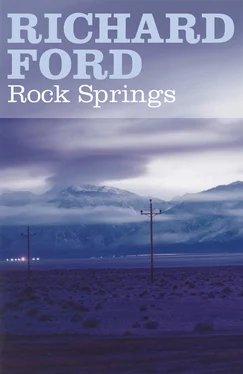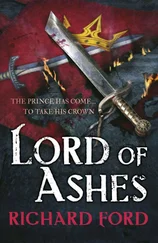Richard Ford - Rock Springs
Здесь есть возможность читать онлайн «Richard Ford - Rock Springs» весь текст электронной книги совершенно бесплатно (целиком полную версию без сокращений). В некоторых случаях можно слушать аудио, скачать через торрент в формате fb2 и присутствует краткое содержание. Год выпуска: 2006, Издательство: Bloomsbury Publishing, Жанр: Современная проза, на английском языке. Описание произведения, (предисловие) а так же отзывы посетителей доступны на портале библиотеки ЛибКат.
- Название:Rock Springs
- Автор:
- Издательство:Bloomsbury Publishing
- Жанр:
- Год:2006
- ISBN:нет данных
- Рейтинг книги:3 / 5. Голосов: 1
-
Избранное:Добавить в избранное
- Отзывы:
-
Ваша оценка:
- 60
- 1
- 2
- 3
- 4
- 5
Rock Springs: краткое содержание, описание и аннотация
Предлагаем к чтению аннотацию, описание, краткое содержание или предисловие (зависит от того, что написал сам автор книги «Rock Springs»). Если вы не нашли необходимую информацию о книге — напишите в комментариях, мы постараемся отыскать её.
Rock Springs — читать онлайн бесплатно полную книгу (весь текст) целиком
Ниже представлен текст книги, разбитый по страницам. Система сохранения места последней прочитанной страницы, позволяет с удобством читать онлайн бесплатно книгу «Rock Springs», без необходимости каждый раз заново искать на чём Вы остановились. Поставьте закладку, и сможете в любой момент перейти на страницу, на которой закончили чтение.
Интервал:
Закладка:
Great Falls
This is not a happy story. I warn you.
My father was a man named Jack Russell, and when I was a young boy in my early teens, we lived with my mother in a house to the east of Great Falls, Montana, near the small town of Highwood and the Highwood Mountains and the Missouri River. It is a flat, treeless benchland there, all of it used for wheat farming, though my father was never a farmer, but was brought up near Tacoma, Washington, in a family that worked for Boeing.
He — my father — had been an Air Force sergeant and had taken his discharge in Great Falls. And instead of going home to Tacoma, where my mother wanted to go, he had taken a civilian’s job with the Air Force, working on planes, which was what he liked to do. And he had rented the house out of town from a farmer who did not want it left standing empty.
The house itself is gone now — I have been to the spot. But the double row of Russian olive trees and two of the outbuildings are still standing in the milkweeds. It was a plain, two-story house with a porch on the front and no place for the cars. At the time, I rode the school bus to Great Falls every morning, and my father drove in while my mother stayed home.
My mother was a tall pretty woman, thin, with black hair and slightly sharp features that made her seem to smile when she wasn’t smiling. She had grown up in Wallace, Idaho, and gone to college a year in Spokane, then moved out to the coast, which is where she met Jack Russell. She was two years older than he was, and married him, she said to me, because he was young and wonderful looking, and because she thought they could leave the sticks and see the world together — which I suppose they did for a while. That was the life she wanted, even before she knew much about wanting anything else or about the future.
When my father wasn’t working on airplanes, he was going hunting or fishing, two things he could do as well as anyone. He had learned to fish, he said, in Iceland, and to hunt ducks up on the DEW line — stations he had visited in the Air Force. And during the time of this — it was 1960—he began to take me with him on what he called his “expeditions.” I thought even then, with as little as I knew, that these were opportunities other boys would dream of having but probably never would. And I don’t think that I was wrong in that.
It is a true thing that my father did not know limits. In the spring, when we would go east to the Judith River Basin and camp up on the banks, he would catch a hundred fish in a weekend, and sometimes more than that. It was all he did from morning until night, and it was never hard for him. He used yellow corn kernels stacked onto a #4 snelled hook, and he would rattle this rig-up along the bottom of a deep pool below a split-shot sinker, and catch fish. And most of the time, because he knew the Judith River and knew how to feel his bait down deep, he could catch fish of good size.
It was the same with ducks, the other thing he liked. When the northern birds were down, usually by mid-October, he would take me and we would build a cattail and wheat-straw blind on one of the tule ponds or sloughs he knew about down the Missouri, where the water was shallow enough to wade. We would set out his decoys to the leeward side of our blind, and he would sprinkle corn on a hunger-line from the decoys to where we were. In the evenings when he came home from the base, we would go and sit out in the blind until the roosting flights came and put down among the decoys — there was never calling involved. And after a while, sometimes it would be an hour and full dark, the ducks would find the corn, and the whole raft of them — sixty, sometimes — would swim in to us. At the moment he judged they were close enough, my father would say to me, “Shine, Jackie,” and I would stand and shine a seal-beam car light out onto the pond, and he would stand up beside me and shoot all the ducks that were there, on the water if he could, but flying and getting up as well. He owned a Model 11 Remington with a long-tube magazine that would hold ten shells, and with that many, and shooting straight over the surface rather than down onto it, he could kill or wound thirty ducks in twenty seconds’ time. I remember distinctly the report of that gun and the flash of it over the water into the dark air, one shot after another, not even so fast, but measured in a way to hit as many as he could.
What my father did with the ducks he killed, and the fish, too, was sell them. It was against the law then to sell wild game, and it is against the law now. And though he kept some for us, most he would take — his fish laid on ice, or his ducks still wet and bagged in the burlap corn sacks — down to the Great Northern Hotel, which was still open then on Second Street in Great Falls, and sell them to the Negro caterer who bought them for his wealthy customers and for the dining car passengers who came through. We would drive in my father’s Plymouth to the back of the hotel — always this was after dark — to a concrete loading ramp and lighted door that were close enough to the yards that I could sometimes see passenger trains waiting at the station, their car lights yellow and warm inside, the passengers dressed in suits, all bound for someplace far away from Montana — Milwaukee or Chicago or New York City, unimaginable places to me, a boy fourteen years old, with my father in the cold dark selling illegal game.
The caterer was a tall, stooped-back man in a white jacket, who my father called “Professor Ducks” or “Professor Fish,” and the Professor referred to my father as “Sarge.” He paid a quarter per pound for trout, a dime for whitefish, a dollar for a mallard duck, two for a speckle or a blue goose, and four dollars for a Canada. I have been with my father when he took away a hundred dollars for fish he’d caught and, in the fall, more than that for ducks and geese. When he had sold game in that way, we would drive out 10th Avenue and stop at a bar called The Mermaid which was by the air base, and he would drink with some friends he knew there, and they would laugh about hunting and fishing while I played pinball and wasted money in the jukebox.
It was on such a night as this that the unhappy things came about. It was in late October. I remember the time because Halloween had not been yet, and in the windows of the houses that I passed every day on the bus to Great Falls, people had put pumpkin lanterns, and set scarecrows in their yards in chairs.
My father and I had been shooting ducks in a slough on the Smith River, upstream from where it enters on the Missouri. He had killed thirty ducks, and we’d driven them down to the Great Northern and sold them there, though my father had kept two back in his corn sack. And when we had driven away, he suddenly said, “Jackie, let’s us go back home tonight. Who cares about those hard-dicks at The Mermaid. I’ll cook these ducks on the grill. We’ll do something different tonight.” He smiled at me in an odd way. This was not a thing he usually said, or the way he usually talked. He liked The Mermaid, and my mother — as far as I knew — didn’t mind it if he went there.
“That sounds good,” I said.
“We’ll surprise your mother,” he said. “We’ll make her happy.”
We drove out past the air base on Highway 87, past where there were planes taking off into the night. The darkness was dotted by the green and red beacons, and the tower light swept the sky and trapped planes as they disappeared over the flat landscape toward Canada or Alaska and the Pacific.
“Boy-oh-boy,” my father said — just out of the dark. I looked at him and his eyes were narrow, and he seemed to be thinking about something. “You know, Jackie,” he said, “your mother said something to me once I’ve never forgotten. She said, ‘Nobody dies of a broken heart.’ This was somewhat before you were born. We were living down in Texas and we’d had some big blow-up, and that was the idea she had. I don’t know why.” He shook his head.
Читать дальшеИнтервал:
Закладка:
Похожие книги на «Rock Springs»
Представляем Вашему вниманию похожие книги на «Rock Springs» списком для выбора. Мы отобрали схожую по названию и смыслу литературу в надежде предоставить читателям больше вариантов отыскать новые, интересные, ещё непрочитанные произведения.
Обсуждение, отзывы о книге «Rock Springs» и просто собственные мнения читателей. Оставьте ваши комментарии, напишите, что Вы думаете о произведении, его смысле или главных героях. Укажите что конкретно понравилось, а что нет, и почему Вы так считаете.












